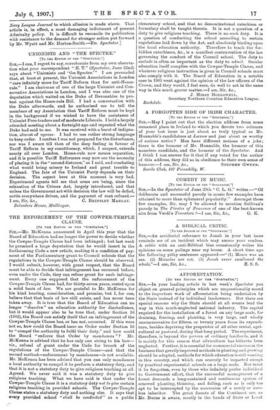THE ENFORCEMENT OF THE COWPER-TEMPLE CLAUSE.
[TO THE EDITOR OF THE "SPECTATOR."]
Sra,—Mr. McKenna announced in April this year that the Board of Education had no longer the power to decide whether the Cowper-Temple Clause had been infringed ; but last week be promised a large deputation that he would insert in the forthcoming Code a new article, making it a condition of pay- ment of the Parliamentary grant to Council schools that the regulations in the Cowper-Temple Clause should be observed.
• I would submit, however, with great respect, that the Board must be able to decide that infringement has occurred before, even under the Code, they can refuse grant for such infringe- ment. Every one supposed that the enforcement of the Cowper-Temple Clause had, for thirty-seven years, rested upon a solid basis of law. We are grateful to Mr. McKenna for his kind hearing, consideration, and promise, but I, for one, believe that that basis of law still exists, and has never been taken away. It is true that the Board of Education can no longer " dissolve " an education authority for disobedience, but it would appear also to be true that, under Section 16 (1902), the Board can satisfy itself that an infringement of the Cowper-Temple Clause has, or has not, occurred. If this were not so, how could the Board issue an Order under Section 16 to "compel the authority to fulfil their duty," and how could the Board "enforce that Order by mandamus"? Mr. McKenna is advised that he has only one string to his bow— viz., refusal of grant under the Code for breach of the regulations of the Cowper-Temple Clause—and that the second method—enforcement by mandamus—is not available. Mr. McKenna has been advised that you can only mandamus a local authority to compel it to perform a statutory duty, and that it is not a statutory duty to give religious teaching at all. Agreed. We never said it was a statutory duty to give religious teaching. What we have said is that under the Cowper-Temple Clause it is a statutory duty not to give certain religious teaching in provided schools. The Cowper-Temple Clause states a statutory duty and nothing else. It says that every provided school "shall be conducted" as a public elementary school, and that no denominational catechism or formulary shall be taught therein. It is not a question of a duty to give religious teaching. There is no such duty. It is a question of conducting the school according to certain regulations laid down by the Act, and absolutely binding upon the local education authority. Therefore to teach the for- bidden catechisms, &c., is a manifest contravention of the law governing the conduct of the Council school. The duty to exclude is often as important as the duty to admit. Secular education itself complies with the Cowper-Temple Clause, and whatever religious instruction is given in Council schools must also comply with it. The Board of Education in a notable case in 1905 went against the opinion of the law officers of the Crown, and they would, I feel sure, do well to act in the same way in this much graver matter.—I am, Sir, &c., J. HIRST HOLLOWELL, Secretary Northern Counties Education League.
Rochdale.














































 Previous page
Previous page